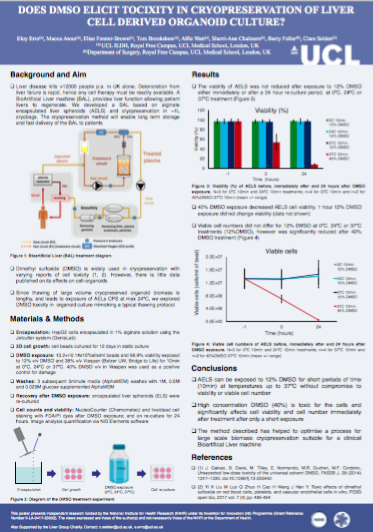 Liver disease kills more than 12,000 people in the UK each year. As deterioration from liver disease is extremely rapid, any cell therapies to treat the disease must be readily available. A bioartificial liver machine (BAL) can provide the liver function and allows patient livers to regenerate.
Liver disease kills more than 12,000 people in the UK each year. As deterioration from liver disease is extremely rapid, any cell therapies to treat the disease must be readily available. A bioartificial liver machine (BAL) can provide the liver function and allows patient livers to regenerate.
The team at University College London have developed a BAL based on alginate encapsulated liver spheroids (AELS) and cryopreservation in >1 litre cryobags. The cryopreservation method enables long term storage and fast delivery of BAL to patients.
At the recent Society of Low Temperature Biology meeting in Seville, the UCL team presented a poster “Does DMSO toxicity in cryopreservation of liver cell derived organoid culture?”. Their approach is intended to help optimise a process for large scale biomass cryopreservation, suitable for a clinical bioartificial liver machine.
The team concluded that AELS can be exposed to 12% dimethyl sulfoxide (DMSO) for up to 10 minutes in temperatures of up to 37 °C without compromise to their viability of viable cell number. However, high concentration DMSO (40%) is toxic for the cells and significantly affects cell viability and cell number immediately after treatment after only a short exposure.
For further information
To download the poster, please click here
Progress on a bio-artificial liver
Cryopreservation for the UCL bioartificial liver
The Liver Group Charity
Society for Low Temperature Biology (SLTB)
